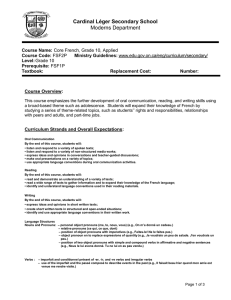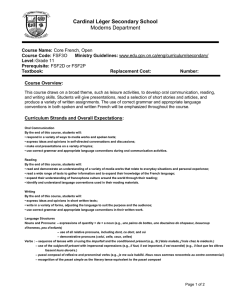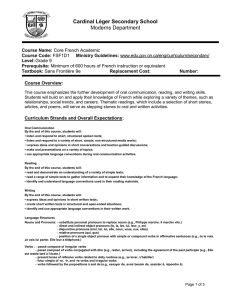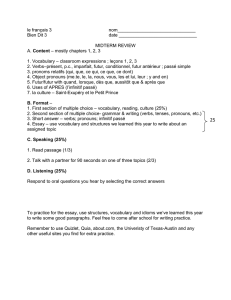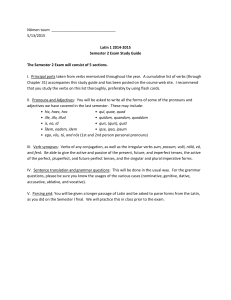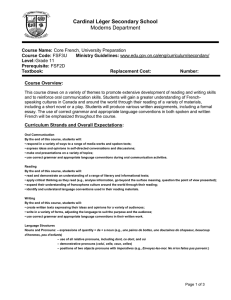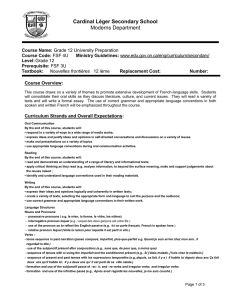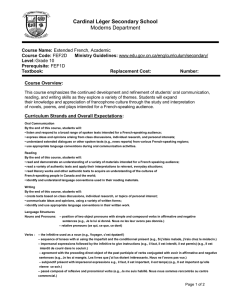Cardinal Léger Secondary School Moderns Department Course Name:
advertisement
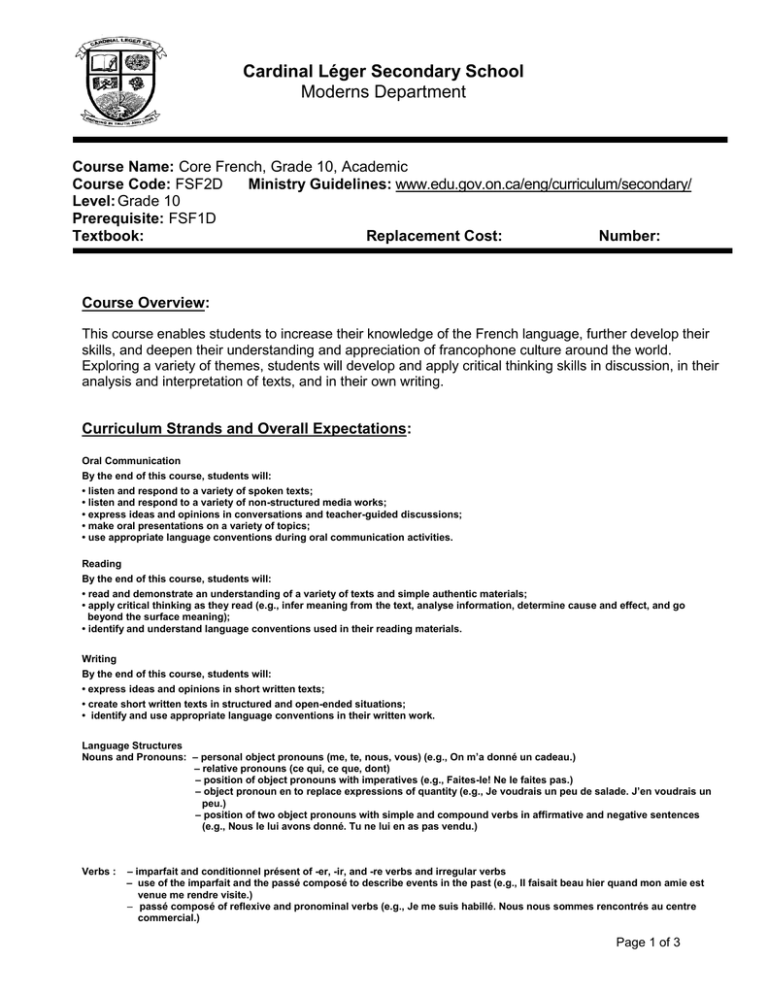
Cardinal Léger Secondary School Moderns Department Course Name: Core French, Grade 10, Academic Course Code: FSF2D Ministry Guidelines: www.edu.gov.on.ca/eng/curriculum/secondary/ Level: Grade 10 Prerequisite: FSF1D Textbook: Replacement Cost: Number: Course Overview: This course enables students to increase their knowledge of the French language, further develop their skills, and deepen their understanding and appreciation of francophone culture around the world. Exploring a variety of themes, students will develop and apply critical thinking skills in discussion, in their analysis and interpretation of texts, and in their own writing. Curriculum Strands and Overall Expectations: Oral Communication By the end of this course, students will: • listen and respond to a variety of spoken texts; • listen and respond to a variety of non-structured media works; • express ideas and opinions in conversations and teacher-guided discussions; • make oral presentations on a variety of topics; • use appropriate language conventions during oral communication activities. Reading By the end of this course, students will: • read and demonstrate an understanding of a variety of texts and simple authentic materials; • apply critical thinking as they read (e.g., infer meaning from the text, analyse information, determine cause and effect, and go beyond the surface meaning); • identify and understand language conventions used in their reading materials. Writing By the end of this course, students will: • express ideas and opinions in short written texts; • create short written texts in structured and open-ended situations; • identify and use appropriate language conventions in their written work. Language Structures Nouns and Pronouns: – personal object pronouns (me, te, nous, vous) (e.g., On m’a donné un cadeau.) – relative pronouns (ce qui, ce que, dont) – position of object pronouns with imperatives (e.g., Faites-le! Ne le faites pas.) – object pronoun en to replace expressions of quantity (e.g., Je voudrais un peu de salade. J’en voudrais un peu.) – position of two object pronouns with simple and compound verbs in affirmative and negative sentences (e.g., Nous le lui avons donné. Tu ne lui en as pas vendu.) Verbs : – imparfait and conditionnel présent of -er, -ir, and -re verbs and irregular verbs – use of the imparfait and the passé composé to describe events in the past (e.g., Il faisait beau hier quand mon amie est venue me rendre visite.) – passé composé of reflexive and pronominal verbs (e.g., Je me suis habillé. Nous nous sommes rencontrés au centre commercial.) Page 1 of 3 Cardinal Léger Secondary School Moderns Department – use of the conditionnel présent to discuss possibility (e.g., Est-ce que tu pourrais laver l’auto, Marc?) and to show politeness (e.g., Je voudrais un café, s.v.p.) – affirmative and negative infinitives following impersonal expressions (e.g., Il est important de se protéger contre les rayons du soleil. Il est préférable de ne pas conduire trop vite.) – agreement with the preceding direct object of the past participle of verbs conjugated with avoir (e.g., Il a vu l’annonce. Il l’a vue.) – sequence of tenses with si using the imparfait and the conditionnel présent (e.g., Si j’étais malade, j’irais chez le médecin.) – use of the subjonctif présent of high-frequency verbs (e.g., avoir, être, aller, faire, savoir) with the impersonal expression il faut (e.g., Il faut que je fasse mes devoirs ce soir.) Prepositions and Conjunctions : – conjunctions (e.g., si, quand, lorsque, dès que, cependant, car, donc) – prepositions with geographical names (e.g., en France, au Canada, à Winnipeg) Sentence Structure : – linking words (e.g., c’est-à-dire, après tout, en effet) Evaluation: Term Work 70% Knowledge and Understanding 30% Thinking 25% Communication 25% Application 20% Final Assessment 30% Formal Examination 20% Culminating Task 10% Course Total 100% Page 2 of 3 Cardinal Léger Secondary School Moderns Department Learning Skills and Work Habits Responsibility Organization Independent Work Collaboration Initiative Self-Regulation E= Excellent G=Good S=Satisfactory N= Needs Improvement Fulfills responsibility and commitments. Takes responsibility for and manages own behavior. Devises and follows a plan and process for completing tasks. Establishes priorities and manages time Independently monitors, assesses, and revises plans to complete tasks and meet goals. Uses class time to complete tasks. Accepts various roles and an equitable share of work in a group. Builds healthy peer-to-peer relationships. Looks for and acts on new ideas and opportunities. Approaches new tasks with a positive attitude. Sets own goals and monitors progress towards achieving them. Seeks clarification or assistance when needed. Missed/Late/Incomplete Assignments It is the student’s responsibility to address missed, late, or incomplete assignments. Students are expected to complete assignments and to adhere to assignment deadlines as follows: Due Date A due date is set by the teacher. 10% Penalty Zone 1 school day late – 3% 2 school days late – 6% 3 school days late – 10% Maximum penalty of 10% Closure Date Once the closure date has passed, work is considered incomplete and a mark of zero applies. Parent Signature: _______________________ Student Signature: ______________________ Page 3 of 3
